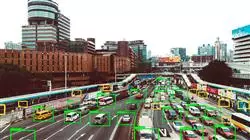University certificate
The world's largest artificial intelligence faculty”
Introduction to the Program
The current importance of Artificial Intelligence makes this Postgraduate diploma a safe bet, with a market in continuous growth and full of opportunities"

Convolutional Neural Networks (CNN) are key elements for solving machine learning problems related to visual data. These architectures have a wide range of applications, being especially useful in the healthcare field. Health professionals use CNNs in their medical programs to diagnose diseases through images such as X-rays or CT scans. In this way, these systems are highly beneficial in planning radiotherapy treatments, thus helping to determine the optimal irradiation dose.
Moreover, these elements can be used to develop innovative solutions that can include remote monitoring.
In this context, TECH implements a Postgraduate diploma oriented to Research, Development and Innovation in the area of Artificial Intelligence.
The curriculum will delve into aspects such as Computer Vision, Transfer Learning or Antagonistic Generative Networks. In addition, the didactic materials will analyze in detail the Natural Language Processing, including advanced techniques such as Word Embedings, Transformersor Sentiment Analysis. The program will also provide the keys to the correct use of GTP Open AI, so that students will be able to generate coherent texts from a given input.
Since this university program is taught completely online, students will enjoy a first-class educational experience without the need to travel to a study center. Similarly, students will strengthen their knowledge through a library of multimedia resources, including case studies and interactive summaries. On the other hand, TECH employs the revolutionary Relearning teaching system. Thanks to this, specialists will enjoy a natural and progressive learning.
Tackle Transfer Learning at the world's best digital university according to Forbes"
This Postgraduate diploma in Smart Cities and Artificial Intelligence (AI) contains the most complete and up-to-date program on the market. The most important features include:
- Case studies presented by experts in Smart Cities and Artificial Intelligence
- The graphic, schematic, and practical contents with which they are created, provide practical information on the disciplines that are essential for professional practice
- Practical exercises where self-assessment can be used to improve learning
- Its special emphasis on innovative methodologies
- Theoretical lessons, questions to the expert, debate forums on controversial topics, and individual reflection assignments
- Content that is accessible from any fixed or portable device with an Internet connection
Want to specialize in GTP Open AI? Get it with this university program in just 450 hours"
The program’s teaching staff includes professionals from the industry who contribute their work experience to this program, as well as renowned specialists from leading societies and prestigious universities.
The multimedia content, developed with the latest educational technology, will provide the professional with situated and contextual learning, i.e., a simulated environment that will provide immersive education programmed to learn in real situations.
This program is designed around Problem-Based Learning, whereby the professional must try to solve the different professional practice situations that arise during the academic year For this purpose, the students will be assisted by an innovative interactive video system created by renowned and experienced experts.
You will master Transform Models and use them to translate texts in different languages accurately"

Thanks to the revolutionary Relearning methodology, you will enjoy a flexible and positive learning experience"
Why study at TECH?
TECH is the world’s largest online university. With an impressive catalog of more than 14,000 university programs available in 11 languages, it is positioned as a leader in employability, with a 99% job placement rate. In addition, it relies on an enormous faculty of more than 6,000 professors of the highest international renown.

Study at the world's largest online university and guarantee your professional success. The future starts at TECH”
The world’s best online university according to FORBES
The prestigious Forbes magazine, specialized in business and finance, has highlighted TECH as “the world's best online university” This is what they have recently stated in an article in their digital edition in which they echo the success story of this institution, “thanks to the academic offer it provides, the selection of its teaching staff, and an innovative learning method aimed at educating the professionals of the future”
A revolutionary study method, a cutting-edge faculty and a practical focus: the key to TECH's success.
The most complete study plans on the university scene
TECH offers the most complete study plans on the university scene, with syllabuses that cover fundamental concepts and, at the same time, the main scientific advances in their specific scientific areas. In addition, these programs are continuously being updated to guarantee students the academic vanguard and the most in-demand professional skills. In this way, the university's qualifications provide its graduates with a significant advantage to propel their careers to success.
TECH offers the most comprehensive and intensive study plans on the current university scene.
A world-class teaching staff
TECH's teaching staff is made up of more than 6,000 professors with the highest international recognition. Professors, researchers and top executives of multinational companies, including Isaiah Covington, performance coach of the Boston Celtics; Magda Romanska, principal investigator at Harvard MetaLAB; Ignacio Wistumba, chairman of the department of translational molecular pathology at MD Anderson Cancer Center; and D.W. Pine, creative director of TIME magazine, among others.
Internationally renowned experts, specialized in different branches of Health, Technology, Communication and Business, form part of the TECH faculty.
A unique learning method
TECH is the first university to use Relearning in all its programs. It is the best online learning methodology, accredited with international teaching quality certifications, provided by prestigious educational agencies. In addition, this disruptive educational model is complemented with the “Case Method”, thereby setting up a unique online teaching strategy. Innovative teaching resources are also implemented, including detailed videos, infographics and interactive summaries.
TECH combines Relearning and the Case Method in all its university programs to guarantee excellent theoretical and practical learning, studying whenever and wherever you want.
The world's largest online university
TECH is the world’s largest online university. We are the largest educational institution, with the best and widest online educational catalog, one hundred percent online and covering the vast majority of areas of knowledge. We offer a large selection of our own degrees and accredited online undergraduate and postgraduate degrees. In total, more than 14,000 university degrees, in eleven different languages, make us the largest educational largest in the world.
TECH has the world's most extensive catalog of academic and official programs, available in more than 11 languages.
Google Premier Partner
The American technology giant has awarded TECH the Google Google Premier Partner badge. This award, which is only available to 3% of the world's companies, highlights the efficient, flexible and tailored experience that this university provides to students. The recognition as a Google Premier Partner not only accredits the maximum rigor, performance and investment in TECH's digital infrastructures, but also places this university as one of the world's leading technology companies.
Google has positioned TECH in the top 3% of the world's most important technology companies by awarding it its Google Premier Partner badge.
The official online university of the NBA
TECH is the official online university of the NBA. Thanks to our agreement with the biggest league in basketball, we offer our students exclusive university programs, as well as a wide variety of educational resources focused on the business of the league and other areas of the sports industry. Each program is made up of a uniquely designed syllabus and features exceptional guest hosts: professionals with a distinguished sports background who will offer their expertise on the most relevant topics.
TECH has been selected by the NBA, the world's top basketball league, as its official online university.
The top-rated university by its students
Students have positioned TECH as the world's top-rated university on the main review websites, with a highest rating of 4.9 out of 5, obtained from more than 1,000 reviews. These results consolidate TECH as the benchmark university institution at an international level, reflecting the excellence and positive impact of its educational model.” reflecting the excellence and positive impact of its educational model.”
TECH is the world’s top-rated university by its students.
Leaders in employability
TECH has managed to become the leading university in employability. 99% of its students obtain jobs in the academic field they have studied, within one year of completing any of the university's programs. A similar number achieve immediate career enhancement. All this thanks to a study methodology that bases its effectiveness on the acquisition of practical skills, which are absolutely necessary for professional development.
99% of TECH graduates find a job within a year of completing their studies.
Postgraduate Diploma in Smart Cities and Artificial Intelligence (AI)
Discover the future of cities with our innovative postgraduate program: the Postgraduate Diploma in Smart Cities and Artificial Intelligence (AI) from TECH Global University. In an increasingly connected world, this program will provide you with the essential skills to design, implement and manage smart solutions that will transform the cities of tomorrow. Our online classes will allow you to access this knowledge from anywhere, adapting to your schedule and pace of life. At TECH, we not only offer you theory, but also practical applications for you to develop concrete skills that will be invaluable in the professional environment. The Postgraduate Diploma will immerse you in the fundamentals of Smart Cities and how Artificial Intelligence plays a crucial role in their development. You will explore concepts such as urban infrastructure optimization, efficient use of resources, smart mobility and improving the quality of life of citizens.







